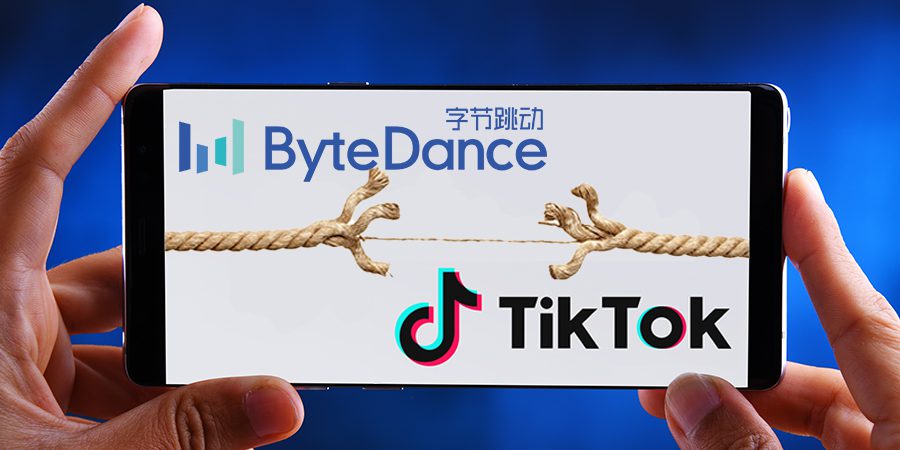Subscribe
"Unlock exclusive insights and elevate your financial wisdom with NetWorth.com — subscribe now to stay ahead in the wealth game!"

In this article, we’ll look at the reasons behind the potential separation of TikTok from its Chinese parent company, ByteDance, as a last resort in response to national security concerns in the United States.
Key Takeaways:
Leaders at TikTok, the popular short-form video app, are reportedly exploring the idea of parting ways with ByteDance Ltd., their Chinese parent company.
This move aims to address the escalating concerns about potential national security risks that have been raised by US officials.
Sources familiar with the situation have indicated that a divestiture, which might involve a sale or an initial public offering (IPO), is being considered as a last resort.
However, the Chinese government would need to consent to any such transaction.
Presently, TikTok is under examination by the United States Committee on Foreign Investment (CFIUS) for concerns related to national security.
In an effort to appease US officials, the company agreed last year to implement various measures through a plan known as Project Texas.
This initiative includes partnering with American tech giant Oracle Corp. to host US user data and review its software, as well as establishing a three-person, government-approved oversight board.
However, the CFIUS process has hit a roadblock, leaving TikTok uncertain about whether their proposed measures will be enough to continue operations in the US.
A few individuals on the committee, specifically from the Department of Justice, have been hesitant to approve TikTok’s suggested plan, as per sources.
TikTok has also been confronted with numerous potential legislative actions in Congress, some of which demand the company’s separation from ByteDance.
Legislators across the political spectrum have expressed apprehension that the app might be compelled to divulge user information to the Chinese authorities or be manipulated as a means of influence by China.
As a result, they have introduced several bipartisan bills calling for either a ban on the video-sharing app or its sale.
Brooke Oberwetter, a spokesperson for TikTok, has argued that neither banning the app nor divesting it from ByteDance would effectively address the national security concerns surrounding data transfers.
She stated, “Under Project Texas, TikTok data for our US users would be held to a significantly higher security standard than any comparable American company.”
Shou Chew, TikTok’s Chief Executive Officer, has been invited to testify before a House committee next week about the app’s data privacy and security practices, as well as its relationship with the Chinese Communist Party.
Lately, GOP members on the House Foreign Affairs Committee approved a bill providing the Biden administration power to prohibit TikTok and other apps deemed as national security threats.
The legislation progressed with a 24-16 vote, following party lines, but it is uncertain when the bill will be presented for a vote on the House floor.
Furthermore, federal agencies are in the process of removing TikTok from government devices, as mandated by a provision in the $1.7 trillion omnibus spending bill enacted in December.
First introduced as a separate bill by Senator Josh Hawley (R-Mo.), this legislation required the Biden administration’s Office of Management and Budget (OMB) to supply directives for organizations to put into effect the No TikTok on Government Devices Act by February 27, 2023.
On the due date, the OMB issued its instructions, allotting agencies a 30-day window to eliminate or restrict TikTok access and establish specific exceptions for law enforcement or national security purposes, as allowed by legislation.
The ongoing legislative efforts to ban TikTok or enforce its separation from ByteDance, along with the removal of the app from government devices, may have significant implications for the company’s presence in the US market.
With the fate of the app hanging in the balance, TikTok faces mounting pressure to address national security concerns and demonstrate that it can operate independently of its Chinese parent company, ByteDance.
As the situation unfolds, TikTok’s leadership must weigh its options and determine the best course of action to protect the interests of its users and the company as a whole.
The potential separation from ByteDance might be seen as a strategic move to alleviate concerns and maintain a strong presence in the US market.
However, the success of such a move would ultimately depend on the willingness of both the US and Chinese governments to approve the separation and any resulting transactions.
In summary, TikTok’s potential separation from ByteDance serves as a last resort to address the escalating national security concerns in the United States.
While the firm faces a national security evaluation by CFIUS, the demands from legislators and federal organizations to eliminate the app from government equipment or prohibit it entirely keep intensifying.
TikTok’s leadership must carefully navigate these challenges and determine the most effective strategy for maintaining its presence in the US market while safeguarding the interests of its users and the company itself.